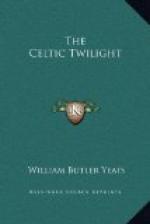This old man always rises before me when I think of X-----. Both seek —one in wandering sentences, the other in symbolic pictures and subtle allegoric poetry-to express a something that lies beyond the range of expression; and both, if X----- will forgive me, have within them the vast and vague extravagance that lies at the bottom of the Celtic heart. The peasant visionaries that are, the landlord duelists that were, and the whole hurly-burly of legends—Cuchulain fighting the sea for two days until the waves pass over him and he dies, Caolte storming the palace of the gods, Oisin seeking in vain for three hundred years to appease his insatiable heart with all the pleasures of faeryland, these two mystics walking up and down upon the mountains uttering the central dreams of their souls in no less dream-laden sentences, and this mind that finds them so interesting—all are a portion of that great Celtic phantasmagoria whose meaning no man has discovered, nor any angel revealed.
VILLAGE GHOSTS
In the great cities we see so little of the world, we drift into our minority. In the little towns and villages there are no minorities; people are not numerous enough. You must see the world there, perforce. Every man is himself a class; every hour carries its new challenge. When you pass the inn at the end of the village you leave your favourite whimsy behind you; for you will meet no one who can share it. We listen to eloquent speaking, read books and write them, settle all the affairs of the universe. The dumb village multitudes pass on unchanging; the feel of the spade in the hand is no different for all our talk: good seasons and bad follow each other as of old. The dumb multitudes are no more concerned with us than is the old horse peering through the rusty gate of the village pound. The ancient map-makers wrote across unexplored regions, “Here are lions.” Across the villages of fishermen and turners of the earth, so different are these from us, we can write but one line that is certain, “Here are ghosts.”
My ghosts inhabit the village of H-----, in Leinster. History has in no manner been burdened by this ancient village, with its crooked lanes, its old abbey churchyard full of long grass, its green background of small fir-trees, and its quay, where lie a few tarry fishing-luggers. In the annals of entomology it is well known. For a small bay lies westward a little, where he who watches night after night may see a certain rare moth fluttering along the edge of the tide, just at the end of evening or the beginning of dawn. A hundred years ago it was carried here from Italy by smugglers in a cargo of silks and laces. If the moth-hunter would throw down his net, and go hunting for ghost tales or tales of the faeries and such-like children of Lillith, he would have need for far less patience.
To approach the village at night a timid man requires




